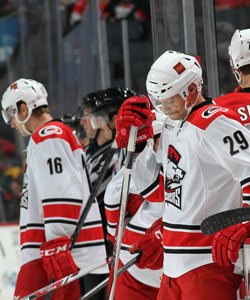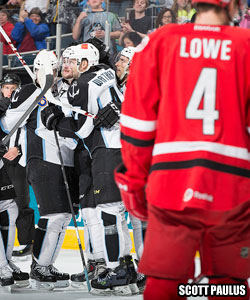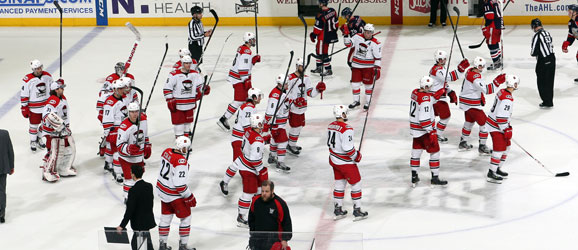As the Checkers returned home following a pair of listless losses to Toronto on Nov. 16 and 19 that extended their regulation losing streak to a franchise-record seven games, a streak not topped by another AHL team in the next five months, missing the playoffs would not have come as a huge surprise. There was no momentum, little depth compared to previous seasons and, seemingly, little hope.
What happened over the rest of the season was a marked improvement. Key players returned and others became key players. Gradual at first with its share of ups and downs along the way, the reversal culminated with a 12-4-0 month of March that put the Checkers back above the cutoff line for the first time since before their record slump. Had the season ended right then, the Checkers would have not only been in the postseason, but in the postseason as a team no one wanted to play in the first round.
The season did not end then. It ended three weeks later, when one win in their last seven games sent the Checkers home for good.
Was the November slide to blame? It was the reason heard most often at this week’s exit meetings.

“That was a real tough part of the year for us,” said rookie forward Brendan Woods. “It was a dagger, looking at it now.”
As dire as things were at that point, the Checkers were able to recover by going 29-18-2 over a four-month battle from December through March. They were in playoff position and in control of their own destiny as recently as April 4, which is why some look to the more recent past.
“The weekend that sticks out in my mind was when we went 0-3 in San Antonio and the two in OK City,” said defenseman Mark Flood, referring to three losses in three days from April 4-6 that saw the team go from being in the driver’s seat to needing help from around the league. “We obviously still had a chance after that, but had that weekend gone a bit better, maybe two of three, we might be in a different position now.”
Rather than rally back from that weekend, the Checkers lost three of their final four games, all of which set up as must-wins until the final game was rendered meaningless by previous struggles.
“We averaged less than two goals a game over a stretch in April and it wasn’t for a lack of chances, we just couldn’t find them,” said Daniels. “You look at the Grand Rapids game and you couldn’t get a tying goal to see what happens. You look at OK City where we were all over them in the last five minutes and lose 1-0. I didn’t hate the way we played. We just couldn’t find the finish or enough goals to win.”
Some other explanations:
“Everyone’s going to point to the three-in-three that we didn’t get a point, but if you look even farther back, probably the story of our year is that we didn’t take care of business on home ice,” said Chris Terry, whose team went 18-18-0 after losing each of its first six at Time Warner Cable Arena. “We let too many games slip away.”
“Every game we lost was in regulation where other teams were still getting the point,” said Brody Sutter, whose team went to a league-low 10 overtime games but enjoyed the best overtime winning percentage of any team in the league with seven victories. “Everybody talks about the three-point games now, but if you can get to overtime it’s still a valuable point. If you take three or four of our losses and put them in overtime, we’re in the playoffs.”
The conclusion to draw from all those conclusions is that, when a team misses the playoffs by mere points, a lot of different conclusions can be made. All of them are valid, outlining the agonizingly small difference between a feel-good story of battling back and never giving up to the jarring disappointment of having the season end early – something that became official when they lost 5-1 to Milwaukee last Friday.

As Daniels admits now, he wasn’t sure what he had going into the season. It remained to be seen which players would make Carolina’s team and stay there and which would have to be replaced by first-year players perhaps not ready for that responsibility. The one sure thing was in goal, where Justin Peters was coming off an All-Star season. Peters played one game before spending the rest of the campaign in Carolina, save for a brief conditioning stint down the stretch.
Aside from their poor finish to the season the Checkers feel they most closely resembled the team that caught fire in March. It was certainly a different team than the one from November.
“It’s hell going through that. It’s not fun,” said Flood. “As a veteran guy you kind of get to see how the season goes. Guys are still kind of jockeying for positions and ice time and that kind of stuff. Our team was at a different stage then and there might have been a little bit more competition.”
“You look at that seven-game losing streak and Chris Terry was out for every game,” said Daniels. “We were still in the midst of going through some goalies until eventually Muser (John Muse) stepped up and took charge of that No. 1 slot. There was some inexperience where once you start losing two, three or four games in a row, that next one is a tough one to win. We just weren’t a great team at that time.”
The second-half resurgence was largely led by the players who were pegged as leaders all along. Zach Boychuk led the league in goals and finished second in points, earning a spot on the AHL’s Second All-Star Team. Terry’s point total would have been a franchise record if not for Boychuk beating him to it. Along with Aaron Palushaj, who had a productive first year in Charlotte, those three accounted for 38 percent of the team’s goals. After taking some time to adjust from a drastic role change from starting the season in Carolina, Brett Sutter scored points at a rate even higher than that of last season’s breakout.
The only caveat to those totals is that much of them came from a dynamic power play that finished second in the league at 22.2 percent – the highest of the Checkers’ four AHL seasons. Exactly half of Boychuk’s goals were on the man advantage, marking a league high and a franchise record. Over half of Terry’s 69 points came on the power play, where he ranked third in the league with 37. Over half of Flood’s 13 goals, a franchise record for a defenseman, were on the power play.
When it was all said and done, no team depended on its power play as much as the Checkers, who scored 33 percent of their goals with the extra man.
“I would have liked to see us score more five-on-five goals,” said Daniels. “Our power play was the one positive for us all year, but as individuals if they want to get to the next level they’ve got to be able to contribute at five-on-five, because if they get called up they might not get a chance on the power play. It’s especially true late in the season where you might not get on the power play as much. You can’t just wait around for the power play late in the game to tie it up and win it."

“He’s a perfect example of what you can do with an opportunity,” said Daniels. “He wins games, to the point where down the stretch he was clearly our No. 1 guy.”
After those first few months, Checkers did have the luxury of being able to use most of their key players most of the time as Carolina, thanks to a large and veteran-heavy roster, was able to cover its own injuries. The big club ended up adding as many players as it took, with NHL veterans Manny Malhotra, Rick DiPietro, Anton Khudobin and Cam Ward all making cameos as they attempted to work their ways back from injury or into the organization’s plans for the first time.
If there was any disappointment from the relative lack of opportunities as compared with recent years –not counting Malhotra and those who returned from conditioning stints, Checkers players played just 70 NHL games this season, down from the previous low of 171 in 2010-11 – it didn’t show. In a season that got off to such a poor start, it easily could have.
“We could have went one of two ways, where we could have packed it in and guys could have gone through the motions the rest of the year and made it a real long year, or we could put the work boots on and get ourselves back in the race, and that’s what we did,” said Daniels. “For me that’s a real positive and tells me a lot about that locker room, the character and the leadership. We didn’t quit and we battled right to the last week of the regular season to get into the playoffs.
“Unfortunately, it didn’t work out.”
At the end of the day, bounce backs and hot stretches and individual accolades notwithstanding, that’s what will stand out the most.
“With how good of a team we had, to not be able to take care of those games at the end of the season is disappointing,” said Boychuk. “For all of us that have been here for four years and missed the playoffs twice, our team was way too good for that and our core was way too good for that. It was definitely unacceptable for us.”






